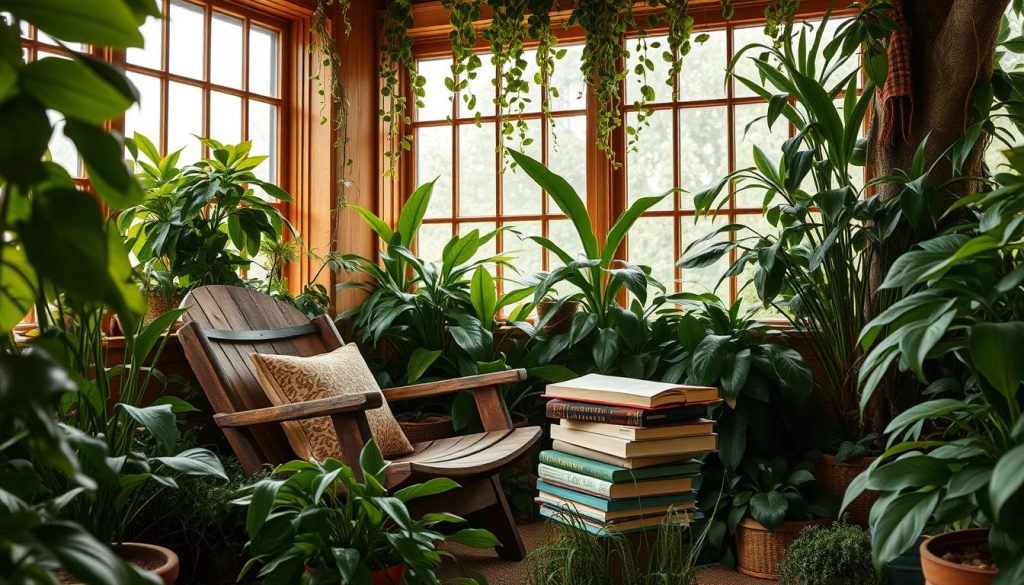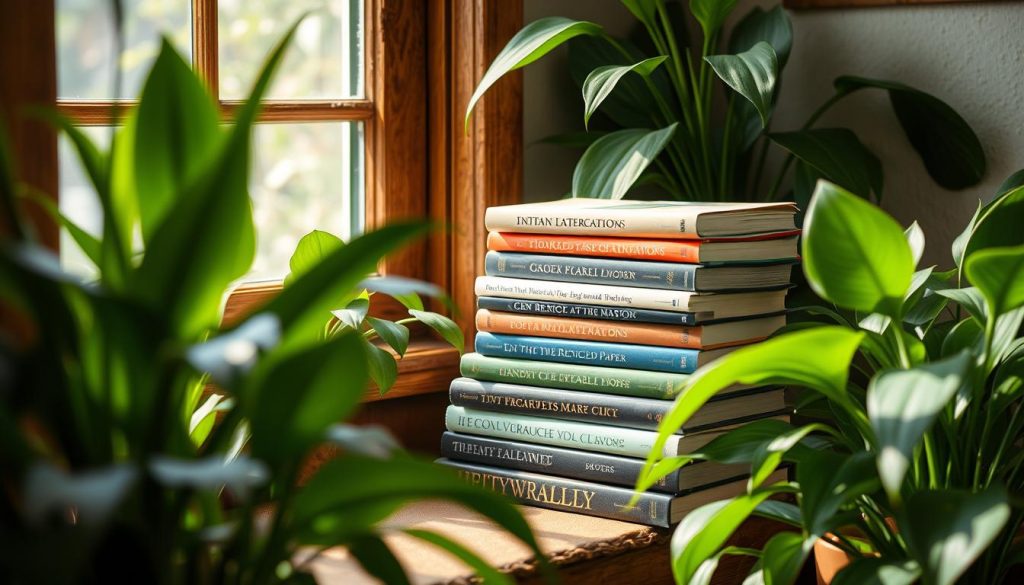I love reading and always have. But, I’ve learned how the publishing world affects our planet. So, I’m excited to share how we can read in a way that’s better for the Earth.
We’ll look at how to read more eco-friendly. This includes picking the right materials and supporting local bookstores. We’ll also talk about digital reading and building a community for sharing books. I hope you’ll be inspired to read more mindfully and sustainably.
Let’s explore how we can enjoy reading without harming the planet. The written word can take us on amazing journeys and inspire us. Let’s do it in a way that’s good for the Earth.
The Importance of Zero Waste in Reading
I love reading and have always thought about how it affects the environment. The publishing world can be very wasteful. From paper books to shipping, it all adds up. That’s why I care about green publishing and literary environmentalism.
Understanding the Concept of Zero Waste
Zero waste is all about reducing waste and living sustainably. For readers, it means thinking about a book’s whole life. From making it to when we’re done with it. It helps us choose better books and enjoy them more.
Why Sustainable Reading Matters
Reading in a sustainable way helps the planet and makes reading better for us. Choosing eco-friendly books and supporting green publishing helps reduce our impact. It makes us appreciate books and stories more.
Understanding zero waste in reading can change the literary world. It encourages us and others to be more eco-friendly. It’s good for us and the planet.
Choosing Eco-Friendly Books
In our search for sustainable books, the materials used are key. Many publishers now offer books made from recycled or sustainably sourced paper. These choices help reduce waste and support the environment.
Materials Used in Book Production
When picking books, look for those printed on recycled paper. Some are even made with vegetable-based inks. Choosing these options makes your reading habits more eco-friendly.
The Benefits of Secondhand Books
- Reduce waste by giving new life to previously loved books
- Support local and independent bookstores, often champions of sustainable literature
- Discover hidden gems and unique titles that may be out of print or hard to find
- Save money while enjoying the same reading experience
Choosing secondhand books is a great way to support sustainable literature. It reduces waste and helps local businesses. You might find rare books that you won’t find anywhere else.
By choosing eco-friendly books and secondhand options, we help the environment. Our actions support a greener future for the publishing industry.
Digital Reading: A Sustainable Alternative

Technology keeps getting better, making us think more about reading without paper. We’ll look at how digital reading affects the environment compared to printed books.
E-Readers vs. Printed Books
E-readers like Kindle or Nook are becoming more popular. They’re small, easy to use, and hold lots of books. They also use less energy and resources than printed books.
The Environmental Impact of Digital Reading
But, digital reading isn’t perfect. Making e-readers and storing digital books uses a lot of energy and resources. This can harm the environment.
Printed books also have an environmental cost. They use paper, ink, and fossil fuels. So, readers have to think about what’s better for the planet.
Choosing between e-readers and printed books depends on what you value most. It’s about finding a balance that’s good for the planet and for reading.
Supporting Independent Bookstores

We have a chance to help the planet by shopping at independent bookstores. These stores focus on being green and offer a special shopping experience. Buying books here helps keep local bookstores alive and cuts down on waste.
The Benefits of Shopping Local
Shopping at independent bookstores has many perks. They know what books their community likes, so they pick the best ones. Plus, the money you spend helps the local economy grow.
How to Find Zero Waste Bookstores
- Look for eco-friendly bookstores in your area. Many independent shops focus on being green.
- Find bookstores with book swapping or lending programs. This way, you can share books without making more waste.
- Choose stores that use recycled or sustainable materials. This helps them reduce their environmental footprint.
- Support stores that work with local groups to promote green reading and community projects.
By shopping at independent bookstores, we help the publishing world and our communities. We can find new books and support stores that care about the planet. Let’s keep these special places alive for future readers.
Sustainable Book Recommendations

Books can help us move towards a greener future. They can inspire us to live more sustainably or teach us about environmental issues. Here’s a list of books that might interest you.
Titles That Promote Zero Waste Living
- Zero Waste Home” by Bea Johnson – This guide shows how to cut down on waste and live simply.
- The Zero-Waste Lifestyle” by Amy Korst – It offers practical tips to reduce waste in your everyday life.
- “Plastic-Free” by Beth Terry – It’s a story of one woman’s journey to a plastic-free life and its effects on her community.
Authors Who Advocate for Sustainability
- Bill McKibben – A well-known author and activist, McKibben’s books like “The End of Nature” and “Eaarth” highlight the need to tackle climate change.
- Naomi Klein – Her books, such as “This Changes Everything” and “The Shock Doctrine,” link environmentalism with social justice.
- Annie Leonard – Author of “The Story of Stuff,” Leonard fights for a sustainable and fair economy.
Reading these books can deepen our understanding of environmental issues. It can also show us ways to work together for a better future.
Tips for a Zero Waste Reading Habit
Starting a zero waste reading lifestyle is easier than you think. Just a few changes in how we handle books can make a big difference. We can enjoy reading more while being kind to the planet.
How to Reduce Waste While Reading
Buying secondhand books is a great first step. Look for them at thrift stores, library sales, and online. It saves money and keeps books out of landfills. Also, taking good care of our books helps them last longer.
Creative Ways to Share or Repurpose Books
After we finish a book, there are many green options. Join book swaps, donate to libraries or schools, or upcycle books into crafts. Book upcycling lets us turn old books into useful items like storage boxes or bookends. It’s a fun way to make reading more eco-friendly.

